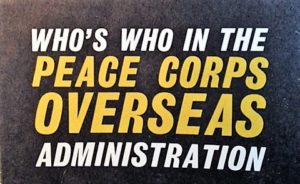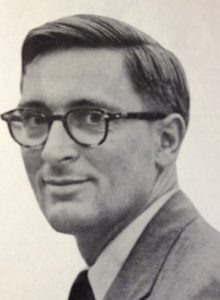Morocco’s First Peace Corps Staff
 On May 2, 1962, the Peace Corps sent Lawrence Williams to Rabat, the capital city of independent Morocco. Williams, then operations officer for French-speaking Africa, joined in discussions which soon led to Peace Corps programs in three countries of West Africa—Morocco, Senegal and the Ivory Coast.
On May 2, 1962, the Peace Corps sent Lawrence Williams to Rabat, the capital city of independent Morocco. Williams, then operations officer for French-speaking Africa, joined in discussions which soon led to Peace Corps programs in three countries of West Africa—Morocco, Senegal and the Ivory Coast.
These discussions were comparatively brief—a sign that in its second year the Peace Corps was becoming an established institution around the world. In mid-June, Williams went to the Ivory Coast for two weeks, returned briefly to Rabat, and on June 29, took off to Dakar in Senegal. By July 8, he was back in Washington.
The program in Morocco called for English teachers and rural community action workers where the emphasis was on surveying and irrigation. The 56 Volunteers who were to carry out this program went into training at California State Polytechnic in San Luis Obispo on October 12, 1962. They arrived in Rabat on February 12, 1963.
On hand to greet them was Deputy Representative Reuben Simmons, who had moved to Morocco less than a month before from his job as Deputy Representative in Tunisia. Simmons was then serving as Acting Representative in Morocco just as he had served as Acting Representative in Tunisia. They regularly assigned Representative in Morocco, Frederic Thomas, arrived in Rabat on May 7.
Fred Thomas was born in New York City. He served almost two years in the Marine Corps, as a shortwave radio operator at Camp Pendleton in California, before he entered college.
In 1952, he graduated from Harvard with a degree in international relations and Middle East studies after spending a summer surveying self-help organizations in Algeria, Morocco and Tunis.
Awarded a Fulbright fellowship, he enrolled for one year at the School of Oriental Studies in Cairo, Egypt, which included two months in rural parts of the Sudan where he studied local government councils.
Named a Ford Foundation research scholar, he set off with his wife to live for a year in villages in Chad, the Sudan and northeast Nigeria. His studies in African local government and the role of tribal authority resulted in articles such as “Juhaina Arabs of Chad,” published in the Middle East Journal and the basis of a dissertation for which he received a Ph.D. from the University of London.
For the next three years, he worked with the Empire Trust Company of New York City. He then transferred to the Mobil Oil Company of Canada and was sent to Tripoli as public relations adviser for the firm’s activities in Libya. It was from Libya that he submitted his application to join the staff of the Peace Corps.
With a knowledge of French and Arabic and extensive experience in North and West Africa, Thomas became an operations officer in the Peace Corps’ Office of Africa programs. He participated in 1961 in the discussions which led to the first Peace Corps program in Tunisia. In 1962, he negotiated programs in Gabon, The Niger Republic and the Republic of the Cameroon.
Named Peace Corps Representative in Morocco he arrived in Rabat on November 17 and completed preparations for the expected arrival of the first Volunteers on January 28.
On December 12, he returned to Washington for consultation. Before he could get back to Rabat, he came down with hepatitis. As a consequence, Simmons was moved from Tunisia to Morocco and the overseas arrival of the Volunteers was postponed until February 11. By May Thomas had recovered, and he returned to Morocco to reassume his duties.
In the first three years of the Peace Corps, the agency’s overseas administrators were relatively free from serious illness. However, in remote Niger, Thomas Echols was also hospitalized for hepatitis. Thomas Carter, later Associate Representative in Senegal, underwent an operation in Washington which forced him to cancel a January 10 flight to Morocco where he was originally scheduled to serve.
Research Document: Who’s Who in the Peace Corps Overseas Administration (1963)
The photographs are by Rowland Scherman, Paul Conklin and Jim Walls, first photographers for the agency.

No comments yet.
Add your comment